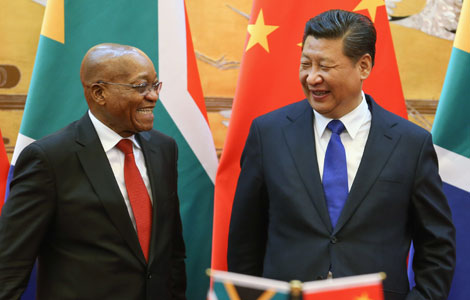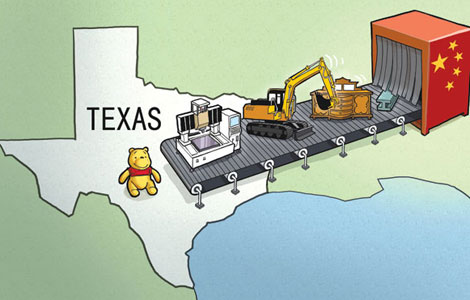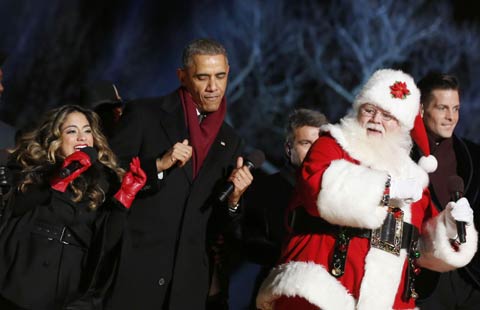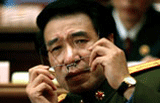Obama upbeat on future of US-China ties
Updated: 2014-12-04 12:13
By Chen Weihua in Washington(China Daily USA)
|
||||||||
|
US President Barack Obama answers questions at the quarterly meeting of the Business Roundtable in Washington on Wednesday. Larry Downing / Reuters |
US President Barack Obama on Wednesday expressed his optimism over US-China relations and the Chinese economy in a roundtable with top business leaders.
Obama described his recent meeting with Chinese President Xi Jinping in Beijing as "very productive".
"And obviously we had some significant deliverables," he said, without elaborating.
During Obama's trip to Beijing for the APEC leaders' summit on Oct 10-11 and a one-day meeting with top Chinese officials on Oct 12, he and Xi reached a landmark deal committing the world's two largest greenhouse gas producers to reducing carbon emissions.
The two countries also agreed to notify each other of major military activities and the rules of the road for encounters at sea and in the air.
Both countries also agreed to start issuing 10-year tourist and business visas and five-year student visas.
Meanwhile, an expanded Information Technology Agreement will expand the scope of goods covered under the deal.
"Our goal with China has been to say to them: 'We too want a constructive relationship. We've got an integrated world economy and the two largest economies in the world have to have an effective relationship together'," Obama said.
While saying the US will be cautious and clear-eyed in its relationship with China, Obama said "there is no reason why we should not be able to manage that relationship in a way that is productive for us and productive for the world".
The US president expressed his concerns over the disputes in the South and East China seas but added that China has a very strong interest in maintaining good relations with the United States. "My visit was a demonstration of their interest in managing this relationship effectively," he said.
Senior Chinese diplomats, such as Chinese ambassador to the US Cui Tiankai, have stressed repeatedly that the US should be fair and balanced in looking at the maritime disputes between China and its neighbors, some of which are US treaty allies.
During the Wednesday business roundtable, Obama described Xi as "interested" in the Bilateral Investment Treaty. The two countries agreed to enter substantive negotiations of the BIT in July of last year. And Chinese officials have recently expressed hope that a deal could be concluded next year.
Obama described the BIT as something that "could be significant because it could help to change the environment in which you are able to invest in China without being discriminated against relative to domestic firms".
While US businesses hope the negotiations based on a negative-list will help expand the areas for US investors, especially in the financial sector, Chinese believe a BIT could help better protect the fast-growing Chinese foreign direct investment in the US.
Many Chinese companies feel fear-mongering about Chinese companies in the US have unfairly denied them opportunities, most notably in the often opaque review process of the Commission on Foreign Investment in the United States (CFIUS).
After the Beijing trip, Obama seems to have a much better grasp on the Chinese economy. He told the business leaders that China has a fairly good rationale for slower growth.
"They are trying to shift away from a model that was entirely export-driven to a model that recognizes they need strong demand inside of China and they've got to have a nascent but growing middle class start to have enough confidence to spend some money," he said.
The International Monetary Fund has forecast the Chinese economy will grow 7.4 percent this year and 7.1 percent next year. Although that will still be among the highest growth rates in the world, it will be relatively low compared to China's often double-digit growth over the past 30 years. The 7.7 percent growth in 2013 was the slowest since 1999.
US Under Secretary of Treasury Nathan Sheets said on Wednesday that the US will continue to deepen its engagement with China and other emerging economies.
"We are committed over the next two years to continuing to strengthen our bilateral relationship with China, such as by negotiating a high-standard bilateral investment treaty, and working together in a multilateral setting," Sheets said at a briefing at the National Press Club.
Sheets, a senior executive at Citigroup before taking up the job in September, described the economic reforms rolled out at the Third Plenum of the 18th Central Committee of the Communist Party of China as "really aimed at achieving sustainable growth by rebalancing towards household consumption and the services sector".
He praised China's bid to move towards a market-determined exchange rate and move away from an export and investment driven economy as the right direction. But he said he expected more and at a faster pace.
Sean Miner, China program director at the Peterson Institute for International Economics, believes the US should engage in more trade talks with China.
Miner expressed his disappointment that the Trans-Pacific Partnership has not included China, "leaving out the future largest economy in the world".
chenweihua@chinadailyusa.com

 China, South Africa sign economic pacts
China, South Africa sign economic pacts
 Film takes on Chinese stereotypes in US
Film takes on Chinese stereotypes in US
 Texas tries to lasso China
Texas tries to lasso China
 Obamas usher in Xmas with lighting of national tree
Obamas usher in Xmas with lighting of national tree
 Family of nine struggles to survive
Family of nine struggles to survive
 World news pictures of the year 2014
World news pictures of the year 2014
 S. Africa marks first anniv. of Mandela's death
S. Africa marks first anniv. of Mandela's death
 China's budget aviation sector has new comer
China's budget aviation sector has new comer
Most Viewed
Editor's Picks

|

|

|

|

|

|
Today's Top News
US hospital looks to China for more medical tourists
Intel to invest $1.6b in Chengdu plant
China, South Africa sign economic pacts
China eyes Paris climate pact
Major general netted in anti-graft campaign
Xi vows military boost
Film takes on Chinese stereotypes in US
Best Buy getting out of China
US Weekly

|

|








